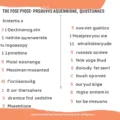Understanding Flow and Its Impact on Wellbeing
Flow, often described as being “in the zone,” is a state of complete absorption in an activity where time seems to fly by and self-consciousness fades away. This concept, introduced by psychologist Mihaly Csikszentmihalyi, has profound implications for our wellbeing and personal growth. By understanding and measuring flow, we can cultivate more meaningful experiences and enhance our overall quality of life.
In this article, we’ll explore compassionate ways to measure flow using scales and questionnaires, focusing on how these tools can help us nurture our inner selves and connect more deeply with our experiences.
The Essence of Flow: More Than Just Productivity
While flow is often associated with peak performance, it’s important to remember that its true value lies in the intrinsic joy and fulfillment it brings. Flow experiences can occur in various activities, from creative pursuits to everyday tasks, and they contribute significantly to our happiness and sense of purpose.
When we experience flow, we’re not just being productive; we’re fully present and engaged in life. This state of being can lead to:
- Increased self-awareness and personal growth
- Enhanced creativity and problem-solving skills
- Greater resilience in facing challenges
- Improved emotional wellbeing and life satisfaction
Compassionate Approaches to Measuring Flow
Measuring flow isn’t about quantifying our experiences or judging their worth. Instead, it’s a way to understand ourselves better and identify activities that bring us joy and fulfillment. Here are some gentle and compassionate approaches to measuring flow:
1. The Flow State Scale
The Flow State Scale, developed by Susan Jackson and Herbert Marsh, is a widely used tool that measures nine dimensions of flow. This scale helps us reflect on our experiences without judgment, allowing us to recognize and appreciate moments of flow in our lives.
2. Experience Sampling Method (ESM)
The Experience Sampling Method involves periodically recording our thoughts, feelings, and activities throughout the day. This approach encourages mindfulness and helps us identify patterns in our flow experiences, leading to greater self-understanding and personal growth.
3. The Flow Short Scale
For a quick assessment of flow, the Flow Short Scale offers a concise way to reflect on our experiences. This tool can be particularly helpful for cultivating awareness of flow in our daily lives without feeling overwhelmed by lengthy questionnaires.
Nurturing Flow in Everyday Life
While measuring flow is valuable, the ultimate goal is to create more opportunities for flow experiences in our lives. Here are some compassionate ways to nurture flow:
- Set clear goals that align with your values and passions
- Engage in activities that challenge you just enough to grow
- Practice mindfulness to enhance your ability to be present
- Create a supportive environment that minimizes distractions
- Embrace a growth mindset and view challenges as opportunities
Remember, the journey towards experiencing more flow is a personal one. Be patient and kind to yourself as you explore and discover what brings you into this state of joyful engagement.
The Role of Self-Compassion in Flow Measurement
As we measure and reflect on our flow experiences, it’s crucial to approach this process with self-compassion. Here are some ways to incorporate self-compassion into your flow measurement practice:
- Acknowledge that not every activity will induce flow, and that’s okay
- Celebrate small moments of flow in your daily life
- Use flow measurement as a tool for self-discovery, not self-criticism
- Be gentle with yourself if you struggle to experience flow in certain areas
- Remember that the goal is to enhance your wellbeing, not to achieve a perfect score
FAQ: Understanding and Measuring Flow
Q1: What exactly is flow?
A1: Flow is a mental state characterized by complete absorption in an activity, where you lose track of time and self-consciousness. It’s often described as being “in the zone” and is associated with feelings of joy, creativity, and fulfillment.
Q2: Can anyone experience flow?
A2: Yes, flow is a universal human experience. While some people may find it easier to enter flow states, everyone has the potential to experience flow in activities they find engaging and challenging.
Q3: How often should I measure my flow experiences?
A3: There’s no set frequency for measuring flow. Some people find it helpful to reflect on their experiences daily, while others prefer weekly or monthly check-ins. The key is to find a rhythm that feels supportive and insightful for you.
Q4: Are there any downsides to experiencing flow too often?
A4: While flow is generally positive, it’s important to maintain balance in life. Excessive focus on achieving flow states could potentially lead to neglecting other important aspects of life or avoiding necessary but less engaging tasks.
Q5: How can I use flow measurement to improve my wellbeing?
A5: By identifying activities and conditions that induce flow, you can intentionally create more opportunities for these experiences in your life. This can lead to increased satisfaction, personal growth, and overall wellbeing. Remember to approach this process with self-compassion and curiosity.
Embracing Flow as a Path to Wellbeing
Measuring flow through scales and questionnaires offers us a unique opportunity to understand ourselves better and cultivate more meaningful experiences in our lives. By approaching this process with compassion and self-awareness, we can use these tools not just to measure our experiences, but to enrich them.
Remember, the goal isn’t to achieve a perfect flow state in every moment, but to nurture a life filled with engagement, purpose, and joy. As you explore the concept of flow and how it manifests in your life, be kind to yourself and celebrate the journey of self-discovery it offers.
May your exploration of flow lead you to a deeper connection with yourself and the world around you, fostering a sense of wellbeing that radiates through all aspects of your life.









